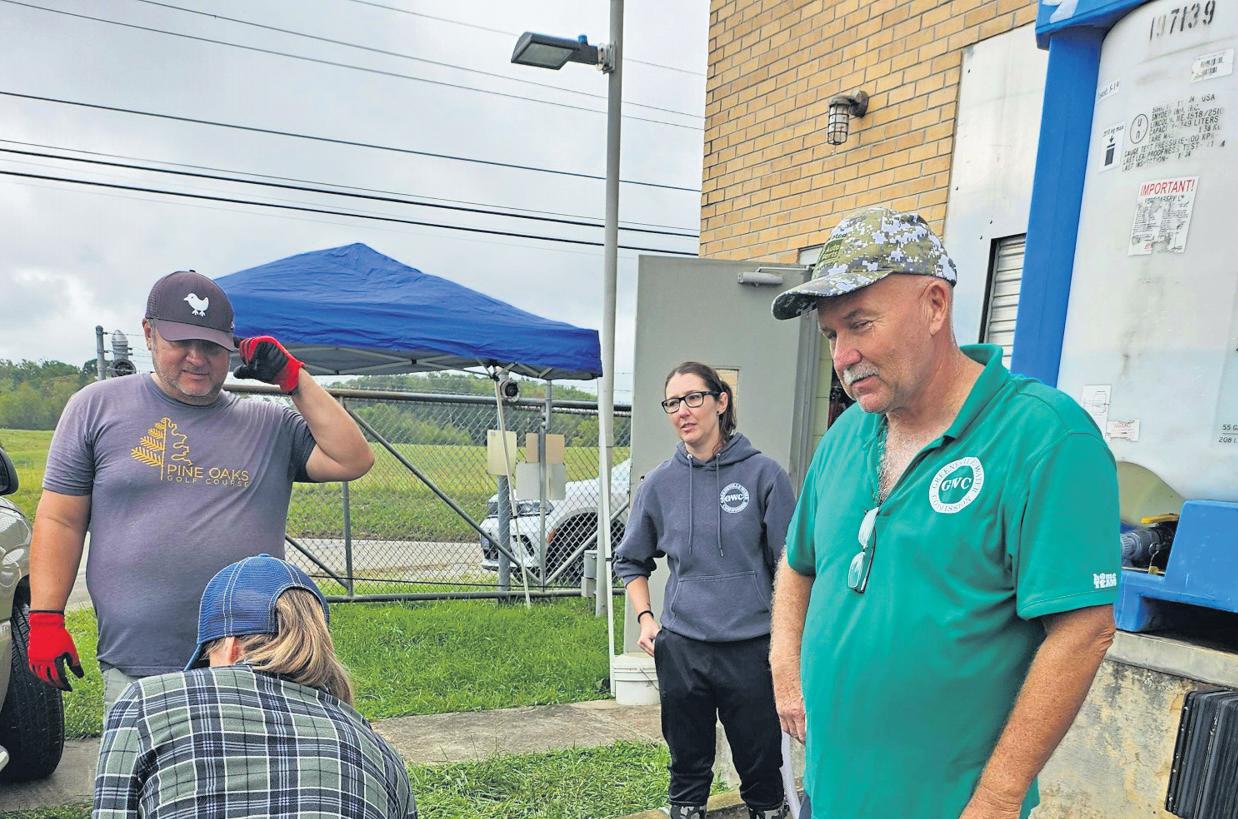






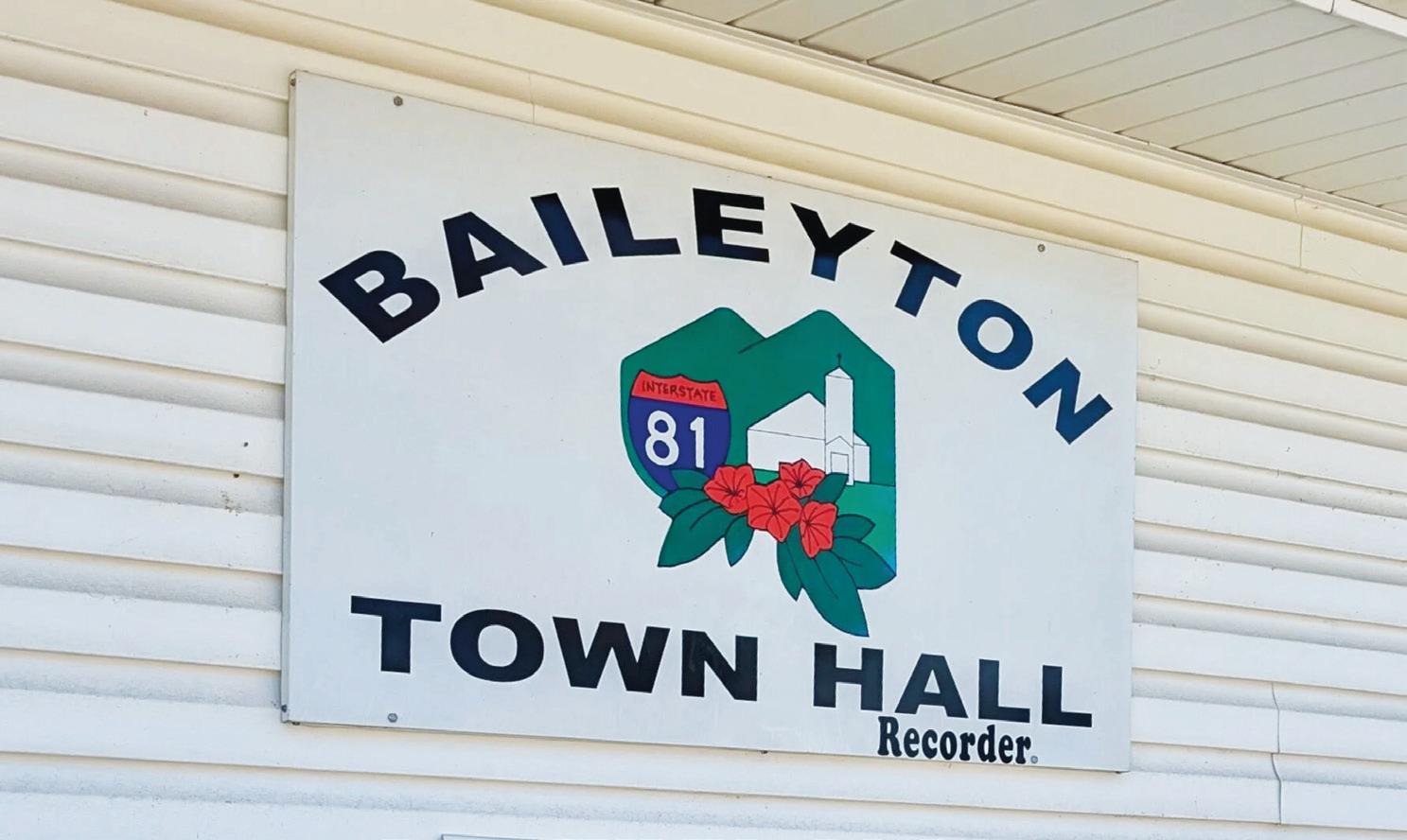













BY SPENCER MORRELL | STAFF WRITER
The Greene County Commission considered abolishing the office of constable in Greene County in 2024, but elected to keep the office in place after multiple discussions on the matter.
The commission first considered the change in January 2024.
For the change to take effect, the resolution to abolish the office of constable would have required a two-thirds vote of support from the County Commission at two consecutive meetings.
In January 2024, the county’s governing body voted 14-7 to abolish the office, an affirmative vote of exactly two-thirds.
However, the measure failed to garner a twothirds vote of support upon its required second consideration in February 2024, only garnering a 12-9 vote of support.
Voting in support of the measure in February were Kathy Crawford, Tim White, Josh Arrowood, Brad Peters, Jan Kiker, Robin Quillen, Pam Carpenter, Lloyd “Hoot” Bowers, Gary Shelton, John Waddle, Lisa Anderson and Teddy Lawing.
Those voting against the resolution were Nick Gunter, Chase Murray, Jason Cobble, Tim Smithson, Bill Dabbs, Lyle Parton, Larkin Clemmer, Jeffery Bible and Paul Burkey.
Gunter and Bible voted for the measure in January 2024, but changed their votes from “yes” votes to “no” votes in February. As a result, the resolution to abolish the office of constable in Greene County failed.
The resolution to abolish the volunteer position was sponsored by Waddle and Bowers. Both said reasons for pursuing the action include issues with liability, training and the usefulness of constables in the present day.
According to Greene County Attorney Roger Woolsey, there were 36 constables in Greene County at one time, and each precinct had one as the Sheriff’s Department was much smaller in size. Now there are only seven constables as the Sheriff’s Department has grown and has more deputies.
“I’m happy with the result. This was a good thing to have all cleared up,” Greene County 5th District Constable Freddie Sams said after the February 2024 vote. “We’re happy and honored to continue to serve the people of Greene County.”
However, the issue of constables would come up again in 2024.
A resolution that would have stripped the office of constable of law enforcement capabilities was rejected by the commission in September.
The commission voted 11-9 to “postpone indefinitely” the resolution, which means not only did the resolution not pass on in September, but it cannot be considered again by the body until the end of the current commission’s term. That term ends in 2026.
About 49 of the 95 counties in Tennessee still have constables, and 47 of those 49 counties have constables with law enforcement powers.
ZONING REGULATIONS TIGHTENED
The County Commission dealt with zoning and land use regulations in 2024.
The Greene County Commission approved an ordinance in March 2024 that enacted stricter regulations on solar farms in Greene County.

The ordinance limits utility-scale solar farms to M-2 High Impact zones on brownfields. Solar farms will also be required to have a setback of 500 feet from the nearest corner of a residential property line to the closest solar array.
Many properties which were previously used as gas stations, landfills, quarries and factories, or properties that may have contamination from unknown sources, qualify as brownfields, according to the state of Tennessee.
Solar arrays for personal use will still be permitted.
The ordinance to put more restrictive zoning regulations on solar farms was approved by a 12-8 vote of the Greene County Commission.
The March 2024 vote ended a 14-month moratorium that paused the permitting of new solar farms, bitcoin mines and wind farms in the county. The goal of the moratorium was to allow time for a state study to be finished and to give county officials the ability to review the study once it was released.
Prior to the moratorium and the March vote, solar farms were permitted in A-1 agricultural zones with 300-foot setbacks and sight buffers in Greene County.
In addition, the County Commission approved stricter regulations for wind farms, cryptocurrency mining facilities and data centers in March 2024. Wind farms are also limited to M-2 High Impact zones on brownfields.
In addition to having to locate on brownfields in M-2 districts, new minimum setback requirements were implemented.
According to the ordinance approved by the commission, the minimum setback for any wind turbine of a wind energy facility from any nonparticipating landowner’s property line will have to be at least equal to three and a half times the total height of the turbine structure as measured from the ground to the maximum height of a windmill’s blade.
The measure passed by way of a 13-7 vote.




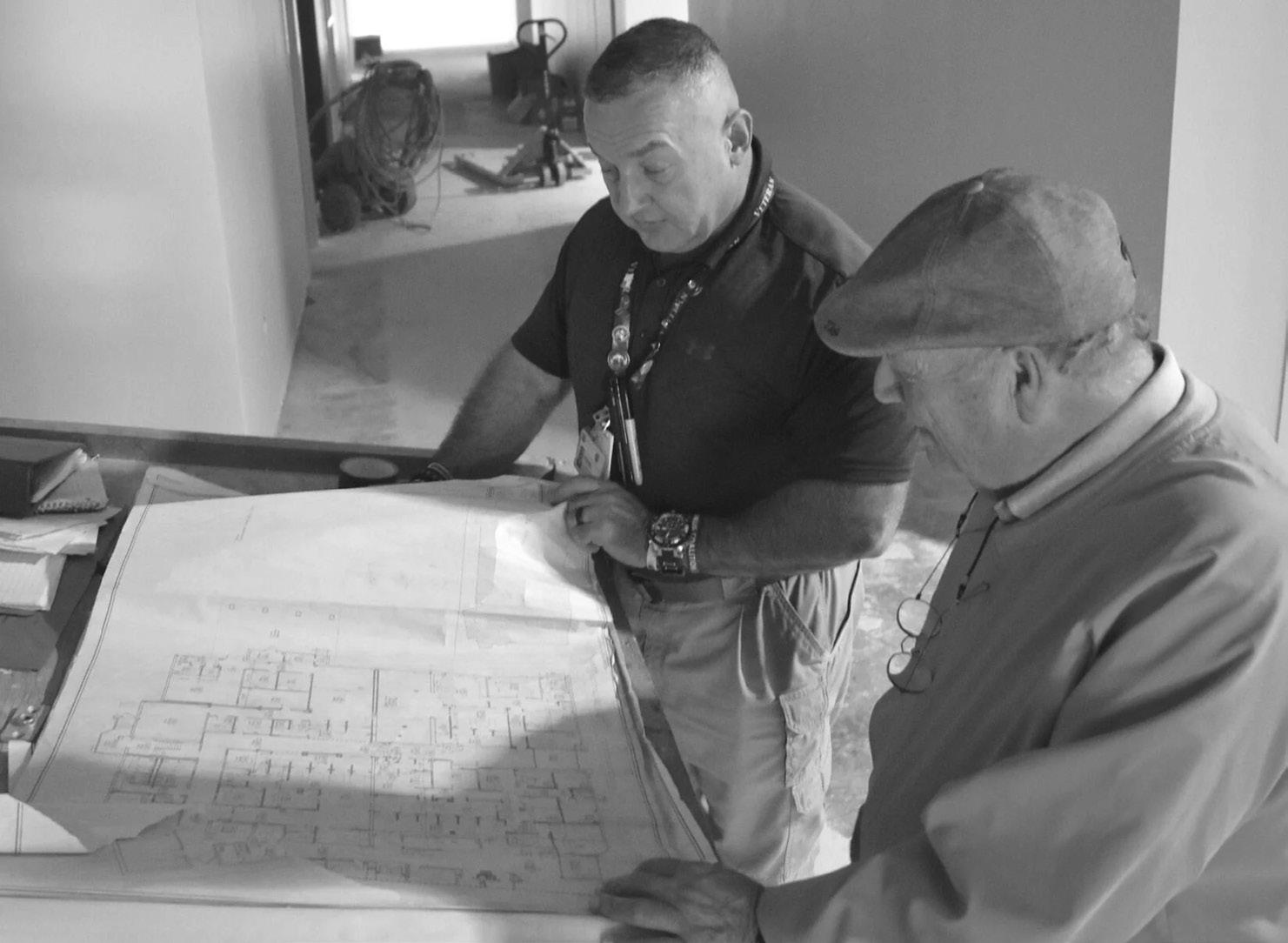
The process of cryptocurrency mining involves computers solving complex mathematical puzzles constantly based on an algorithm. The unique solutions to the puzzles result in new cryptocurrency.
A cryptocurrency mining facility can involve numerous computers mining at the same time nonstop, which produces a large amount of heat. Cryptocurrency mines must have robust cooling infrastructure, such as large cooling fans, to keep the computers in them from overheating.
These cooling fans create a constant noise as the mining facility operates, often 24 hours a day and seven days a week.
The new regulations limit cryptocurrency mining facilities and data centers to M-2 Heavy Impact zones.
The facilities will now have setback requirements of 200 feet from all property lines. However, setback requirements could increase based on required noise assessments.
Before placing a cryptocurrency mine, applicants must have a qualified third party acoustical engineer perform a study on the property that would include recording the ambient noise and vibration levels of the surrounding area. Based on the study and modeling, the facility would not be permitted to raise the noise level at adjoining property lines more than five decibels over the ambient level recorded during the day. At night, noise at property lines will not be permitted to be raised at all above the ambient level recorded at night.
Any noise or vibration mitigation measures would then be subject to review after construction.
The ordinance restricting cryptocurrency mines and data centers was approved 15-5.
In June 2024, the County Commission took further action in regard to zoning when it approved a six-month moratorium on new campgrounds and RV parks in Greene County. The moratorium was later extended an additional three months by the commission.
The moratorium only affected new campgrounds or expansions, not campgrounds already established. Campgrounds or expansions that already have documents with the planning office that have been given preliminary approval, of which there are two, are also unaffected by the pause.
Greene County Building official Tim Tweed told the County Commission in June 2024 that he felt the moratorium was necessary to give the Building and Zoning office time to hone more specific guidance and regulations for those looking to establish an RV park or campground in Greene County.
The commission also approved new regulations for short-term rental properties in Greene County during the June 2024 meeting.
A short-term rental property, such as ones found on vacation rental sites Airbnb and Vrbo, will be defined as being a property that is meant to be rented out for 30 days or less.
The county’s existing regulations did not specifically regulate short-term rentals. According to planning office officials, there are over 200 such properties currently in the county.
The regulations endorsed did not restrict zoning for short-term rentals in Greene County, but established minimum regulations, including some addressing health and safety, for the rentals.
According to the new regulations, short-term rentals will be required to provide and maintain smoke detectors, carbon monoxide detectors, fire extinguishers and other emergency equipment in operating order.
Other regulations address parking availability, permit requirements and partial rentals.
The County Commission also took action to deal with flood damage the county experienced after Hurricane Helene swept through the region in September 2024. The remnants of the hurricane caused the Nolichucky River to flood, destroying both private and public property.
The County Commission approved a resolution in October 2024 that waived building permit fees associated with the repair or replacement of homes, businesses or structures damaged as a result of flooding from Hurricane Helene for a period of one year.
Only those whose property was damaged by

flooding are eligible to have fees waived.
Property owners are still be required to obtain permits through the Building and Zoning Office and comply with required inspections during the rebuilding process.
Originally, the resolution presented to the commission would have waived permit fees for 90 days. However, the commission voted to amend the the resolution and lengthen the waiver period to a year.
In December 2024, the County Commission unanimously approved a resolution accepting state loan funding for disaster recovery efforts in Greene County, and earmarking any further state funding the county may receive for the repair of bridges and roads.
Greene County received around $17.6 million through Tennessee Gov. Bill Lee’s Helene Emergency Assistance Loans Program, which provided a 10-year zero-interest loan to help pay for flood damage repairs.
According to Greene County Director of Accounts and Budgets Danny Lowery, the funding has been provided by the Tennessee Emergency Management Agency to the Greene County government, which then in turn will loan it to local water utilities that need to make repairs.
Those utilities will then apply for Federal Emergency Management relief funding, and when that funding arrives, which could take years according to Lowery, the utilities would repay their loans to Greene County, which in turn would repay TEMA.
The county will disburse the loan funding to local utilities as reimbursements for invoices.
Of the $17.6 million, the Greeneville Water Commission will receive $14.1 million for repairs, Chuckey Utility District will receive $1.5 million and Glen Hills Utility District will receive $545,500.
Greene County will retain about $1.4 million of the loan funding to pay for costs associated with debris removal after the flood, according to Lowery.
Renovations continued at the Takoma Regional Hospital building, which is now under the ownership of Greene County in 2024.
Ballad’s Strong Futures program moved out of the facility in September 2024, which allowed the speed of renovations to increase.
Ballad paid Greene County a total of $500,000 for the rental of the floor for the three-year term.
The county’s efforts to renovate the old hospital to house nearly all county offices have been ongoing. However, work had been slowed somewhat at times due to having to maintain a comfortable environment on the fourth floor for the Strong Futures program.
Greene County Mayor Kevin Morrison said in September 2024 the importance of the program to Greene County outweighed any delays experienced in renovating the former Takoma Hospital by maintaining the program on the fourth
floor of the building for the past couple years.
Officials expect to be able to begin moving some county offices to the Takoma building in spring of this year.
In October 2024, the commission approved a resolution authorizing the purchase of the property that the county’s Hal Henard Convenience Center sits on from the Town of Greeneville and the Greene County Board of Education. Part of the county’s asphalt plant storage also sits on the property.
The Greene County Board of Education owned two-thirds of the property, while the Town of Greeneville owned one-third of the property.
Both the town government and the county school board voted to sell their portions of the property to the county.
The discovery of the ownership of the property was made as Greene County and Greeneville officials were working through splitting assets at the Greene Technology Center as the county works to institute career and technical education classes at county high school campuses.
The 5.1 acres were purchased at a cost of $100,000.
In April 2024, the Greene County Commission voted to adopt an official Greene County flag.
The adopted Greene County flag is green with two blue lines running across it. It is adorned with four gold stars with a golden rendering of the Greene County seal planted in the center of the flag. A banner bearing the national motto of “In God We Trust” is placed under the county seal.
Each facet of the flag’s design symbolizes a part of Greene County.
The green color is meant to symbolize vibrancy and perpetual life, according to the resolution, and to reflect the county’s landscape.
The two stripes of blue that run across the flag represent the two largest waterways in Greene County, those being the Nolichucky River in the south and Lick Creek in the north.
The four gold stars spread across the flag represent Greene County’s four incorporated municipalities: Greeneville, Tusculum, Mosheim and Baileyton.
The gold color of the stars was chosen to represent brightness, brilliance and value.
The center of the flag holds the county seal, colored in gold. The center was chosen for the seal to show “unity, cohesion, pride and commonality” for all of Greene County, according to adoption resolution.
The “In God We Trust” banner is meant to “acknowledge Greene County’s faith-based history and heritage” including its role in the establishment of
University.
BY SPENCER MORRELL STAFF WRITER
The Town of Greeneville completed restoration and repair work on the cupola clock tower that sits atop Town Hall in 2024.
In recent years, the cupola had fallen into disrepair. Its windows had become damaged and leaky, and the wood had sustained heavy water damage. Birds had also infiltrated the cupola, adding to the destruction.
In July 2024, the City Council approved a bid for $59,890 from J. Ross Painting and Restoration to repair the cupola. Carpentry, painting, partial glass pane replacement, and other restoration work occurred in September 2024.
Separately, The Verdin Company, which has been in the business of bells and clocks since 1842, installed a new digital clock controller and new movement motors for the four clocks in the tower in December 2024 for a cost of $4,800.
The total cost for the cupola and clock repair was $64,690.
Prior to 2024’s restoration effort, the last time the cupola and clocks had been worked on was 2006. At that time, mechanical clock elements were replaced by electric motors, along with other repairs.
Town Hall was dedicated in 1967, and the clock tower was named after Mike Opingari. Opingari was an Albanian immigrant, who was a successful entrepreneur and American patriot who lived in Greeneville for several years. Funding bequeathed from Opingari to the town was used to install the clock tower.
PARK EXPANDED
The town also celebrated the expansion and rededication of Coach J.J. Jones Memorial Park in September 2024 at the historic George Clem School.
The Town of Greeneville, Greeneville Parks & Recreation Department, and George Clem Multicultural Alliance officials revealed a new playground, swings, new basketball goals and fencing, as well as repaved courts at the park’s grand opening.
The new park, which is located in the Wesley Heights community at 312 Floral St., cost about $50,000 to upgrade.
Greeneville City Manager Todd Smith said in September that the project began when city officials met early on in 2024 with members of the George Clem Multicultural Alliance to brainstorm ideas for the community.
Smith said seeing the crowd of kids using the newly improved basketball courts in September made him think, “Our future looks bright.”
Jones was a teacher and coach at George Clem High School and later Greeneville High School.
He was head football coach at George Clem School from 1952 to 1964 and never had a losing season.
He began coaching in 1950 and served the local school system until his retirement in 1982.
The Greeneville City Council and Greeneville Municipal Planning Commission also considered a special zoning exception that would allow a residential reentry center, also known as a halfway house, to locate in an M-2 high impact zone in Greeneville in March 2024.
An existing building in Mt. Pleasant Industrial Park was eyed for the reentry center. However, the center would not have been able to locate in the industrial park due to zoning issues unless a special exception were created.
The facility, under the ownership of Midway Rehabilitation Center, would have been geared toward helping offenders who are reaching the end of their sentence in the Federal Bureau of Prisons system reenter society. Those in the program often work in local factories or businesses and are monitored by GPS tracking units.
The request for a special exemption received a cool reception by members of the City Council and Planning Commission, with members expressing concern not only about the idea of granting a special exemption that could open the door to other requests but about

the nature of the facility itself.
While a special zoning exemption was not provided for the facility, that does not mean that such a facility cannot locate in Greeneville in other zones.
According to Town of Greeneville Planning Director Randy Davenport, a facility such as the one Midway was trying to locate in an M-2 zone could locate within other zones within Greeneville without the need for the creation of a special exception.
A similar institutional facility could locate in a high density residential district or a business district.
In June 2024, the City Council unanimously accepted a bid for the installation of a new traffic signal on U.S. Highway 11E at the intersection of Serral Drive.
The Shops at Greeneville development near the intersection is expected to increase traffic in the area, though the studies showed that a signal was needed at the intersection regardless of the development, according to officials.
The development already includes a Texas Roadhouse restaurant and a Panda Express restaurant.
The accepted bid totaled $383,944. The town had originally budgeted $350,000 for the signal. However, Smith recommended the council accept the bid.
The council voted in September 2023 to split the cost of the signal with the developer of the property.
On the $350,000 budget, the town was to pay $250,000 while Schaad Brown Real Estate was to pay $100,000.
Due to the bid being over budget, the town paid $283,000.
The traffic light went into operation in late February 2025.
CITY COUNCIL SEES NEW FACE
A mayoral and City Council election was held in August 2024, which led to a change in the makeup of the town’s council.
Tim Teague and Matt Hensley won the two 2nd Ward City Council seats up for election.
Teague was an incumbent in the race, while Hensley was a challenger and collected more votes than incumbent Scott Bullington.
Teague received 396 votes while Hensley received 388, making them the top two finishers in the race and Greeneville’s 2nd Ward City Council members for the next four years.
Bullington placed third with 318 votes, while candidates Jonathan Cave and Peter Higgins received 219 and 170 votes respectively.
Around 19% of the 2nd Ward’s 4,317 registered voters participated in the election, according to the Greene County Election Commission.
It is Hensley’s first time holding elected office, while Teague has served as a City Council member since 2020. He also previously served on the governing board from 1999 to 2003.
Cal Doty won reelection to Greeneville’s mayor seat handily, defeating challenger W.T. Daniels in a repeat of 2022’s matchup, when Doty defeated then-incumbent Daniels to win the office.
Doty received 1,154 votes in the 2024 election, while Daniels received 783.
Prior to becoming mayor, Doty served as an alderman from 2018 until 2021, before resigning in accordance with the town’s charter to run for mayor.
The election saw about a 20% turnout among the registered




voters in Greeneville, according to information provided by the Greene County Election Commission.
The three winners were sworn in to serve four-year terms in September due to changes made to the town’s charter that will gradually move elected positions away from two-year terms, and move elections to evennumbered years to be held at the same time as other state and federal
elections in an effort to save money and increase voter turnout. There will no longer be any Greeneville City Council elections held in an odd-numbered year out of conjunction with any other county, state or federal elections.
LIQUOR RETAILERS REGULATED
BY KEN LITTLE | STAFF WRITER
The City of Tusculum enjoyed a busy and productive year in 2024, and most of those activities will extend into 2025, according to Mayor Alan Corley.
The State of Tennessee broke ground in 2024 on two large projects along East Andrew Johnson Highway on the grounds of the former Greene Valley Development Center. Several administrative buildings and cottages have been demolished to make way for a regional office of the Tennessee Department of Disabilities and Aging covering about 11 acres, and a Tennessee College of Applied Technology covering about 7 acres. Both projects are scheduled to be completed in 2026 and will represent a total investment of about $100 million in state and federal dollars.
“At long last, the TusculumGreeneville-Greene County Industrial Development Board gained ownership of 336 acres of the former Greene Valley property south of Edens Road with plans to develop a business park,” Corley said.
The Tusculum Planning Commission created a new zoning district, designated MX-2, for that property that will allow the development of office space, health care facilities, commercial properties, and light industrial facilities.
“There has already been significant interest in the property. In fact, the Greene County Health Department has announced plans to build a new $6.5 million health facility there, and Eternal Water has announced plans to build a spring water bottling facility, with an investment of $26 million and 50 to 60 new jobs.
“We expect that interest to continue as we work to improve infrastructure for the property in the coming years,” Corley said.
Although Tusculum was fortunate to not receive significant damage from Hurricane Helene, many of the city’s neighbors did.
“Of course, we lost the (Route 107/Erwin Highway) Kinser Bridge, which has significantly affected traffic patterns in the city, adding significant additional vehicle and truck traffic to Shiloh Road and other city streets as drivers find a way around the bridges that are out,” Corley said.
“Losing the bridge has also significantly affected the Tusculum Fire Department’s responses to its coverage area across the river,” he said.
The Tusculum Police Department, public works department, volunteer fire department and recorder’s office organized, coordinated, and staffed a water distribution site at ChuckeyDoak Middle School for several weeks that served all of eastern Greene County.
School speed zone cameras and equipment will be installed in 2025 in the city’s three public school school zones.
“There will be a grace period after they are installed to allow drivers to understand the system. When our officers clock drivers doing 55 mph in a 15 mph school zone, or 75 mph in a 35 mph speed zone, it is apparent that we need to take additional steps to control speeding to protect our children. Full information will be published as the system is implemented,” Corley said.
Tusculum was awarded a Community Development Block Grant in late 2024 to improve vehicular and pedestrian traffic safety, especially in the area around Tusculum University and Doak School.
“Improvements will include
improved pedestrian crossings, improved lighting, sidewalks, and other safety improvements.
The grant provides funding of up to $1 million, with the city providing about a $250,000 match.
Work will also begin in 2025 on improvements to the city’s wastewater treatment facility, the result of a $1 million Tennessee Department of Environment and Conservation American Plan grant, also with about a $250,000 city match.
The Suburban LaVilla Inn, a motel at 4825 E. Andrew Johnson Highway “was the subject of much activity last year,” Corley said.
“Based on years of data provided by the Tusculum Police Department, Greene County Sheriff’s Department, EMS and others, the Greene County District Attorney’s office issued an abatement order in late May 2024 describing the property as a public nuisance and ordering it to be closed,” he said.
“As a part of that process, the Tusculum building official inspected the premises and issued a condemnation order for the property based on multiple fire, building, and life safety code violations. The business remains closed as these issues work through the Circuit Court system,” Corley said.
Tusculum conducted a city election in November 2024. Two of the three city commissioner seats were up for election. The incumbents, Barbara Britton and Alan Corley, ran unopposed and were each reelected to a four-year term. The other commissioner seat is held by Mike Burns, whose term does not expire until 2026.
After the election, commissioners reelected Corley as mayor and Britton as vice-mayor for two-year terms.
After the Tusculum Volunteer Fire Department occupied its new station in 2023, the Tusuclum Public Works Department moved into the former fire department space at Tusuclum City Hall and now has their first “official” office, Corley said.
Plans are in the works to build a new city hall adjacent to the building in use at 145 Alexander St. since the early 1960s.
“As a part of our long-term plan, we are now considering new space for the police department, recorder’s office, and (for a) public meeting area. We have developed a plan for the new space and hope to pursue that goal as funding allows,” Corley said.
Residential construction continues to be strong in the City of Tusculum, with 16 new residential building permits issued in 2024, “continuing a recent trend of significant growth.”
Based on the U.S. 2020 Census, Tusculum’s population was 3,298,

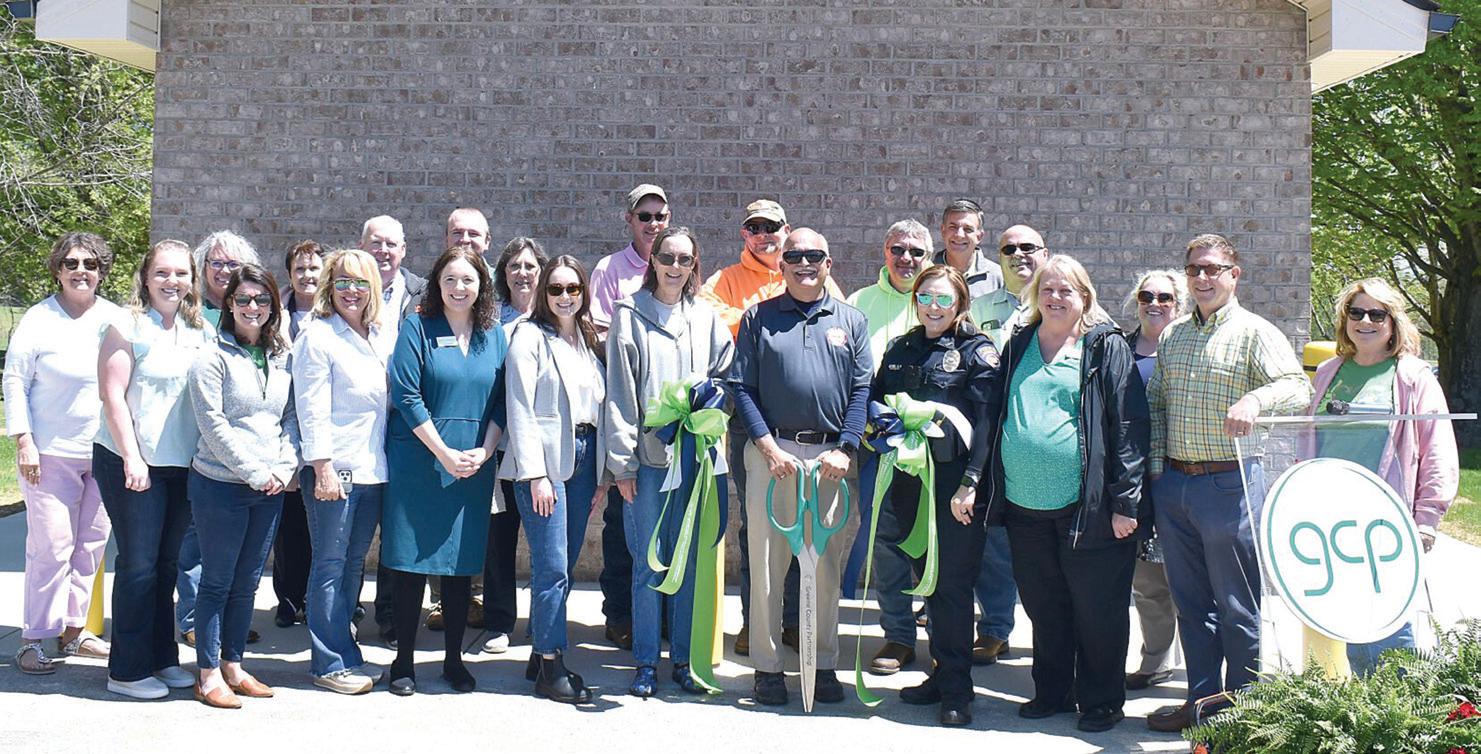

an increase of 23.8% since the 2010 census.
The population of Tusculum was 3,389 based on U.S. Census estimates released in May 2024.
“This growth can be attributed to
our dedicated elected and appointed officials, but especially to our proud employees and volunteers in the public works and police departments, the city recorder’s office, and the Tusculum Volunteer Fire Department,” Corley said.


BY SPENCER MORRELL STAFF WRITER
The Town of Mosheim marked the 50th anniversary of its official incorporation in 2024, and a celebration was held in August to commemorate the milestone.
Mosheim was named after Mosheim College. Established in the 1870s, the college was named after German theologian and scholar Johann Lorenz von Mosheim. However, the community did not become incorporated until long after it was named.
Mosheim is the youngest municipality in Greene County, forming after Greeneville, Baileyton and Tusculum.
The town officially designates 1974 as the year of incorporation for the town, with the first meeting of the town’s Board of Mayor and Aldermen taking place on April 11, 1974.
While the first meeting of the town’s board was held in 1974, the community voted in a referendum to incorporate in December 1973.
According to a Greeneville Sun article written by Wayne Phillips in late 1973, the idea of incorporation had been raised twice before in Mosheim.
The community voted against incorporation in 1963, with 154 voting against the measure and 113 voting for it.
The issue of incorporation was then voted on again in 1968, and it again it failed with 170 voting against incorporation and 120 voting for it.
However, in late 1973, those in the Mosheim community voted overwhelming to form the Town of Mosheim, by a more than 5-1 margin.
Out of 336 votes cast, 284 voted in favor of incorporation and 52 voted against the measure.
Ross Reed was the first mayor of the town, and the current town hall was constructed in 1978.
The incorporation was driven in part by issues with the town’s water supply, according to a Dec. 11, 1973, Greeneville Sun article.
Mosheim’s Blue Springs had been the source of water for the community for decades, but in 1973 the State of Tennessee Health Department said that as the community grew larger, the water source was becoming inadequate and possibly contaminated.
The article mentions a report on the spring that noted “it is possible that at any time, as a result of more development in the Big Ridge area behind the springs, septic tank discharges may begin percolating into the underground streams feeding Blue Springs.”
State funding was needed to make changes to the water system, and becoming a town allowed Mosheim to receive local shares of state taxes such as sales and gasoline taxes.
Mosheim still is maintained through those local tax shares and sales tax, and does not have a property tax.
The celebration held in August to mark the anniversary included a concert and fireworks show at Volunteer Speedway.
Before the fireworks show, which finished with a big, colorful and impressive finale, the Corey Stevenson Band and the Dugger Band rocked out before an appreciative crowd that gathered in the stands of the raceway for the celebration.
Fifty years since its inception, Mosheim worked toward welcoming one of its largest commercial developments in 2024.
The Town of Mosheim Planning Commission unanimously granted preliminary approval to a plat for the Mosheim Crossing development planned near Exit 23 during a meeting in March 2024.
The new development is planned for 30 acres of property behind and beside the Marathon gas station and Wendy’s fast-food restaurant at Exit 23.
The developer, Joe Patel, owns and operates JPP Property Management and Joe Squared Construction based in Morristown. Patel has a license agreement with the international hotel chain Marriott for the construction of a 115-room hotel. The “dual-brand”
hotel would include a Fairfield Inn by Marriott and a TownPlace Suites by Marriott under one roof.
The development would then grow from the hotel to include restaurants and retail spaces, and is planned to include the installation of a traffic signal, two entrances and one exit.
A 20-year tax increment financing agreement was approved for the development by the Greene County Commission.
The plat given preliminary approval by the Mosheim Planning Commission in March 2024 showed 18 divided lots in the development.
The plat also includes two roads that will be subject to the Town of Mosheim’s standards and considered for approval when they are built.
The Mosheim Planning Commission unanimously approved a stormwater drainage and retention pond plan for the planned development in July.
A plat for the development will be considered for final approval once the roads are constructed.
The town also tightened regulations regarding accessory structures in the town.
The ordinance given final approval in May 2024 states that “no ready removable shall be used for business or manufacturing unless the building is constructed or modified in accordance with the applicable adopted code. Nothing herein shall prohibit an owner of a ready removable from modifying a pre-existing ready removable to meet a use class as defined by the IBC (International Building Code) for which it was not originally designed, nor for a ready removable manufacturer to construct a ready removable to meet any use class.”
In February 2024, the Mosheim Board of Mayor and Aldermen approved initial adjustments to the town’s zoning ordinance.
The changes approved in February 2024 prohibit any “ready-removable” to be modified for use as residential, recreational or emergency housing in Mosheim. The term “readyremovable” refers to a structure without any foundation, footings or other support mechanisms that allow a structure to be easily relocated, but which may include electrical wiring, according to the State Fire Marshal.
The changes also added definitions for shipping containers and “readyremovable” structures such as sheds and portable carports in zoning guidelines.
LEADERSHIP UNCHANGED
Mosheim saw no changes in its leadership in the local 2024 elections in August, with all incumbents running uncontested to retain their seats.
Rick Cunningham remained the mayor of Mosheim, while the town’s aldermen remained James Foshie, Stacy Carter, Matthew Solomon and Marc Campbell.
BOARD GIVES NORTH
GREENE UTILITIES RELIEF
In December 2024, members of the newly appointed North Greene Utilities Inc. board of directors approached the Mosheim Board of Mayor and Aldermen on Thursday evening asking for financial relief in regard to the water rates the town charges North Greene Utilities.
The members of Mosheim Board of Mayor and Aldermen and Cunningham expressed an intent to work with North Greene Utilities to relieve some of the financial stress the local utility was experiencing. In addition to pumping water out of Lick Creek, the utility purchases water from nearby districts.
North Greene Utilities purchases water from Kingsport at a cost of $3.42 per 1,000 gallons, Old Knox Utilities at a cost of $2.22 per 1,000 gallons and had been buying water from the Town of Mosheim at a cost of $7.50 per 1,000 gallons.
Earlier in 2024, officials stated that the utility has around $2.5 million in debt, and in December 2024 North Greene Utilities board member Chris Stone said the utility currently owed Mosheim around $124,000 for water service.
The Mosheim Board of Mayor and

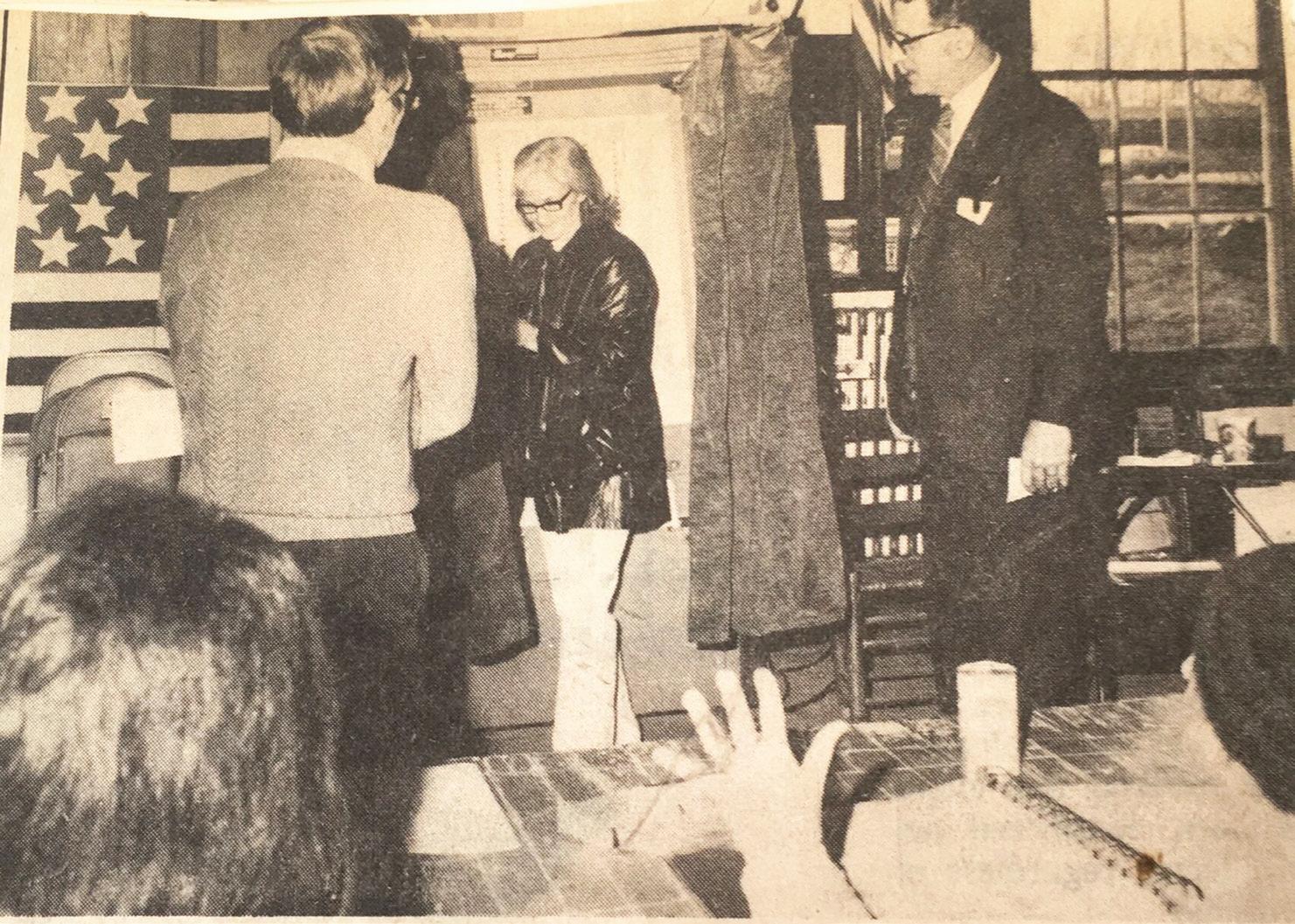

Aldermen held workshops with the North Greene board, and worked to come up with a new special utility water rate that could be used by North Greene.
In February 2025, the board unanimously approved a utility rate with a minimum bill of $500 for the first 100,000 gallons used, then $3.75 for each 1,000 gallons used over the initial 100,000.
The Mosheim board also unanimously approved a resolution that will retroactively apply the new rate to North Greene Utilities’ outstanding debt with the town of
Mosheim. The debt dates back to September 2024.
Cunningham said the Town of Mosheim would do what it could to assist North Greene Utilities through its financial difficulties in a December 2024 meeting of the board.
“We’re looking forward to working with you guys. You’ve got a great community out there. It’s a special place,” Cunningham said. “We’re going to do our best to get you the best rate we can, and look forward to future collaboration. We look forward to doing our part, to stepping up and helping our neighbors out.”



BY NELSON MORAIS | STAFF WRITER
“I think we’re trying to head in the right direction. I’m hoping we can make progress and maybe get some more businesses downtown.
“There’s only a little over 6 miles of paved road (in Baileyton), so it’s a small town.”
So said recently Sherrie Ottinger, an alderwoman for the Town of Baileyton, which is located in northern Greene County 13 miles north of Greeneville off Interstate 81 at Exit 36.
In November, customers voted not to transfer operations of North Greene Utilities Inc. to Greene County.
Instead, they voted for the appointment of a new committee of five members who would provide more transparency to the water utility’s customers moving forward.
“It’s a pretty complicated situation, just to be honest, and we’re still learning things,” said Dale “Bud” Tucker, president of the new board at a meeting in December in the cafeteria of Baileyton Elementary School.
The five members were Tucker, Mark Klepper, Chad Harmon, Chris Stone and Jason Crawford.
In addition to pumping water out of Lick Creek, the utility purchases water from nearby districts.
Joshua Ferguson was demoted from his position of police chief on Feb. 21, 2025, “for various reasons, including insubordination, record-keeping and public distrust,” Mayor Jamie Tilson stated.
A public hearing on the employment status of the former police chief was scheduled for March 11 at town hall.
Ferguson had been the town’s police chief since 2013. He was also on the Greene County 911 board of directors.
In addition, the town had a vacancy after firing a police officer in late 2024.
At the January 2025 meeting of the Baileyton board of mayor and aldermen, Tilson stood by his decision to fire former Baileyton K-9 police officer Allen Tauscher in November, citing “credibility” problems with the officer.
Although given the opportunity to do so, no board member made a motion at the meeting to reinstate the fired police officer, so the mayor’s decision stood.


Tilson also said in January there is an ongoing Tennessee Bureau of Investigation probe of Tauscher which began under the previous mayor’s administration.
In February, the TBI confirmed an investigation “remains ongoing” concerning allegations of misconduct involving “a former officer with the Baileyton Police Department.”
The town currently has four police cruisers, which includes one standby cruiser.
The Baileyton Board of Mayor and Aldermen voted in February 2024 to give the GreenevilleGreene County EMS exclusivity on non-emergency ambulance calls.
Tilson was elected the town’s new mayor in August.
Kenny Kerr, the previous mayor, was elected in 2020 to a four-year term.
In November, Kerr became an alderman on the board of mayor and aldermen.
In addition, there are three more who serve on the Board of Mayor and Aldermen, which meets at Town Hall on the first Tuesday of each month at 7 p.m.: Ottinger, Steven Hall and Andrew “Andy” Pierce.
Tilson has a full-time job as a clinical application analyst for Jupiter Medical Center in Jupiter, Florida. He also has a gunsmith business.
The town is currently awaiting approval from the Tennessee Department of Environment and Conservation to begin the bidding process for a TDEC grant of $600,000 to upgrade the sewer plant, pump stations and aged pumps in individual homes.













A new pump truck was purchased by the town in May 2024 for $12,000.
In 2024, a federal grant of approximately $300,000 was approved for improvements to Baileyton Park.
Funds will go toward acquiring new playground equipment for the park.
Any money left over after the purchase of the playground equipment will go toward paving the park’s driveway, said Ottinger in February.
The town started handling its own sewer utility billing in 2023. Bills may be paid by mail or in person at Town Hall, which also has an after-hours drop box.
Online payments began for the town’s sewer utility billing in October 2024.
Significant progress was made in 2024 for the restoration of a historical library and museum in Baileyton.
The Baileyton Area Historical Society is restoring the building located on the corner of Main and Brunner streets.
The 1,020-square-foot brick and white block building is slated to become a combination community museum and library. Its address is 1323 Baileyton Main Street.
It will likely have books, artifacts, and photos of area history, including that of Baileyton and surrounding communities in the northern part of Greene County, said Barbara Southerland, vicepresident of the historical society.
In 2024, new windows were installed. Insulation was nearly all installed as of the end of February.
An anonymous donor provided sheetrock for the interior of the building. Doors were refinished, though not hung in yet.
The bathroom was framed. Plumbing was installed, though not yet hooked up to the sewer system as of the end of February.
Stephanie Howell, treasurer for the historical society, stated in February, ”Having grown up in Baileyton and then being away for several years, it greatly disturbed me when I returned to see so many of our old buildings either completely gone or in disrepair.
“I also noticed the pride in our little town seemed lessened, so I felt that restoration of such wonderful buildings was an important way to reverse that trend.”
Southerland said the historical society continues to look for more members and financial support. For more information, call 423-620-8580.
The popular, well-attended Baileyton Cruise-In car shows, which are fundraisers for the town’s volunteer fire department, will be held again this






year on the third Saturday of each month, from March through September.
The Baileyton Celebration marked its 30th annual Celebration on a Saturday and Sunday in September, welcoming thousands of people to Baileyton for the event.
It featured a parade, tractor show, 5k race, crafts, food, fun and celebrity guests and impersonators.
The theme for the 30th celebration was “Legends.”
Three of The Brady Bunch kids, John Wayne’s lookalike grandson and author Thomas J. Wayne and Byron Cherry from the “Dukes of Hazzard” TV show were the star personalities at the celebration.
Barry Williams, Mike Lookinland and Susan Olsen, who played Greg, Bobby and Cindy Brady respectively on the show, busily signed autographs and took photos with fans throughout the event.
There were around 15 impersonators, including some of Dolly Parton, Elton John, Elvis Presley, Wynona Judd, Loretta Lynn, Johnny Depp, Barney Fife, Gomer Pyle and others from the fictional town of Mayberry.
Marvel characters were present, as well. Some guests doubled as musical entertainment.
Organizer Donna Bailey called The Brady Bunch








kids the “big attraction” of the event, which she estimated generated a turnout of about 2,000 people total for both days.
“It was maybe one of the best years ever in terms of attendance,” Bailey said recently.
“The weather was perfect. The Brady Bunch were the most down-to-earth people. The people of Baileyton really took to them.
“The entertainment (overall) was excellent. I thought it was one of the better ones we’ve had.”
Members of the United Volunteer Fire Department were honored at the event for their 50 years of service to the community.
In 2024, a new roof was put on the flat part of the fire hall’s roof at a cost of $36,640 less an insurance payout.
Jay Whilen is chief of the fire department in Baileyton. He said in February there is a dire need for more volunteers to join the fire department.
The Town of Baileyton is home to 436 people, which is comprised of 193 households and 105 families, according to the 2020 U.S. census.
In 2020, the median income for a household in the Town of Baileyton was $20,139, and the median income for a family was $34,375.
According to the U.S. Census Bureau, Baileyton has a total area of 1.7 square miles, all of it land.














In May 2024, the City Council unanimously approved changes to the town’s code regarding liquor retailers.
The change established a cap system on liquor stores within the Town of Greeneville using population figures. Prior to the change, the town’s code did not set limits for liquor retailers based on population.
The change caps the number of liquor retailers at the current level of six. It will then allow for one retailer to be added for every 5,000
person increase in population in Greeneville.
Smith noted that the town would need to have a population of about 30,000 people before another liquor store would be permitted to open.
All six current locations in Greeneville are “grandfathered in” under the change, according to Smith, and will continue to operate and not be forced to close. Smith noted that if one of the establishments were to close, a new liquor store would be able to reopen on the same property without population growth.









































































































TheGreeneville WaterCommission wouldlike to convey theirheart felt thanks to the wonder ful communit ythatwelivein.
Theflooding from Helene wasdevastating to ourwater intake,but thecommunit ycame together and suppor tedeach other like the close knit small town we are.
Again, thank youfor your suppor t, your patience, and your resilience!




